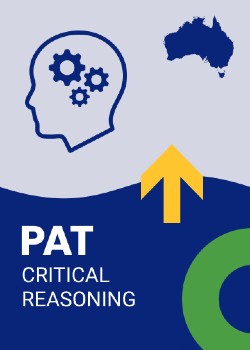
Measuring critical reasoning: an essential 21st century skill
ACER news 4 Oct 2021 5 minute readA new PAT assessment will measure a hard-to-capture skill: critical reasoning.
Skills such as critical and creative thinking are becoming increasingly important for living and working in the 21st century. They are also emerging as essential criteria for learning, as indicated in Australia through the inclusion of critical and creative thinking as one of seven essential ‘general capabilities’ integrated into the education system. These skills are complex and there are particular challenges to integrating them across the curriculum – and to measuring them.
A new assessment in the ACER Progressive Achievement suite launching in October 2021 will help educators better understand some of the aspects of these skills, describe their students’ critical reasoning achievement and target teaching where it’s needed most.
 Critical thinking and critical reasoning
Critical thinking and critical reasoning
PAT Critical Reasoning targets aspects of the broader skill of ‘critical thinking’ or, as the Australian Curriculum defines it, ‘Critical and Creative Thinking’.
Critical thinking is increasingly important in a world characterised by an explosion of information and competing claims. In order to take their places as responsible citizens and innovative workers, students need to develop the cognitive tools of the critical thinker.
In a world in which fake news abounds, equipping students with critical thinking skills has become a crucial educational goal.
A critical thinker is someone who can identify the obstacles to clear and accurate thinking and knows how to solve problems and achieve their goals based on the best available information. Although critical thinking is often developed in the context of specific learning areas, there is also value in an explicit focus on teaching and learning critical thinking. Such explicit and systematic teaching not only enhances the development of these skills, it also facilitates the application of these skills to complex real-world situations beyond the classroom.
Putting reasoning skills under the lens
While acknowledging the importance of a broader conception, PAT Critical Reasoning targets a subset of critical thinking, namely those aspects concerned with:
- The logical relationships between ideas
- The analysis and evaluation of argument.
Critical reasoning is the ability to reason through sets of propositions, rules, conditions, statements and premises to arrive at a true or valid conclusion. It requires the ability to apply logical concepts such as inference, causality, contradiction and consistency. It can be done reflectively to evaluate the truth or validity of a given conclusion. It can also be applied beyond the parameters of a given argument or set of conditions, in order to make sound predictions as to what an argument or set of conditions mean – or whether they are still valid – in a different context. It entails the ability to identify fallacies and technical flaws in various representations of reasoning.
Growing critical reasoning skills
Central to ACER’s Progressive Achievement approach is the concept of measuring learning growth through the application of skills and knowledge in practice, alongside the acquisition of curriculum-based content. In this way, every student is able to demonstrate progress, regardless of starting points. PAT Critical Reasoning assesses three strands, or skill areas:
- Conceptual reasoning
- Basic logic
- Argument analysis.
In ‘typical’ development of critical reasoning ability, students progress from being able to recognise the logical implications of simple, explicitly stated concepts and rules to being able to analyse the logical relationships between the stated and unstated elements of an argument that might be encountered in an educational context or in public discourse.
Through detailed descriptions of bands of student achievement, PAT Critical Reasoning reveals insights into what students know and are capable of in this valuable domain, and tracks their progress over time.
Try it free
PAT Critical Reasoning launches 11 October. Why not try it for yourself, free for 30 days? Find out more.